If you feel like everyone has been obsessed with personal growth lately, you may be onto something. The global online coaching market keeps growing and is projected to reach $11.7 billion by 2032. Evidently, generic self-help resources are not enough — people crave personalized guidance and mentorship and are ready to invest in their success.
What does it mean for coaches? On the one hand, the coaching landscape has never been so competitive, which may feel intimidating at first. On the other hand, there are now limitless ways to package one’s expertise and deliver it to their target audience.
This post will help you understand how to market your coaching business and cut through the noise while staying true to your personal brand. We’ll walk you through the key steps of building a strong coaching marketing strategy and give you practical tips on how to highlight your unique background and approach. Off we go!
What are the main challenges of digital marketing for coaches?
Digital marketing for coaches has its own tricky aspects that set it apart from other industries. Here are some of them.
Proving your credibility
Anyone can call themselves a coach and start selling webinars without having any factual expertise in the matter — that’s why the term “Instagram guru” has become practically derogatory. Wary consumers are fed up with fake social media personas — they demand authenticity, tangible value, and in-depth knowledge.
Potential clients need to trust your expertise before they commit to your services, which can be difficult to establish in the digital space. With the help of coaching marketing, you can precisely validate and address their concerns, proving that you have walked miles in their shoes before becoming a seasoned expert. By sharing valuable content pieces, authentic behind-the-scenes snippets, and customer success stories, you get to build and nurture that trust for years to come.
Finding your own niche and establishing your coaching persona
Choosing a coach is a bit like choosing a therapist — the client and the expert need to click in order to fruitfully work and grow together. Considering that many coaches offer similar services, standing out requires a well-defined niche. With the help of targeted marketing, you can make it easier for your potential audience to discover and match with your coaching persona, carefully addressing their specific needs.
Keeping your audience curious and engaged
Personal coaching tends to be a premium service, and committing to it is a big decision. The main challenge here is to keep your follower base on social media hooked, regardless of whether they’re your current clients or just considering.
Coaching marketing allows you to cleverly present and package your expertise in a way that makes even “unripe” potential customers stick around and interact with your content, slowly letting their guard down and taking your offer more seriously. With high-quality content, you gain the ability to speak directly to your audience’s pain points and plant the seeds of long-term interest in their minds.
Converting casual prospects into devoted clients
Turning mildly interested individuals into actual paying clients is no easy task, especially when offering intangible services like coaching. With a solid coaching marketing strategy in place, you leave nothing to chance — it allows you to set up a reliable sales funnel with lead magnets (like free eBooks, guides, or discovery sessions), nurturing email flows, and clear calls to action.
Maintaining an immaculate online reputation
Negative reviews or feedback can significantly impact your reputation, which is everything in the coaching business. To control the narrative around your brand, you need to stay present, open, and proactive in the online space and beyond.
Coaching marketing empowers you to actively shape and manage your online reputation by responding to feedback, encouraging satisfied customers to leave positive reviews, and clearly communicating about your coaching methods, prices, and what people can expect.
The key aspects of coaching marketing
Coaching marketing tactics can play a vital role in enhancing your visibility, credibility, and client engagement. The following aspects, in particular, are crucial for reaching and retaining the right audience as a niche expert and mentor:
- Strong focus on personal branding. As a coach, your brand is a reflection of you as a person. Unlike other industries where the product or company is the focal point, in coaching, you are the brand. Your digital marketing strategy must focus on showcasing your personality, values, and unique coaching style. This includes personal stories, behind-the-scenes content, and direct engagement with your audience.
- Insightful, actionable content. Coaches are often seen as thought leaders. By providing in-depth educational content tailored to the trends of a specific social media platform, you demonstrate that you live up to your credentials and can deliver even more value in one-on-one sessions.
- Emphasis on community building. For coaches, it’s important to foster a sense of community and belonging among their clients. Social media groups, chats, and other community-building efforts should be integral parts of the marketing strategy for your coaching business. These efforts help you engage with your audience on a deeper level and create a supportive environment for your clients.
- Maintaining relationships with clients. Success in coaching is heavily reliant on strong, personalized relationships with clients. To nourish those, you can create personalized experiences, like weekly newsletters, livestream discussions, Q&As, and other tailored content.
- Respect for longer consideration times. A powerful coaching marketing strategy is the one that is designed to nurture leads over time. This includes providing consistent value, maintaining ongoing communication, and gradually building the relationship until the client is ready to commit.
Now that you know what digital marketing for coaches is all about, let’s focus on the practical side of things.
How to build a winning coaching marketing strategy
The following steps will help you give your coaching business a good start or a long-awaited revamp. Each step is accompanied by real-life examples of marketing assets from different life, financial, and health coaches.
Your website is often the first interaction potential clients will have with your coaching business. A polished, professional design immediately radiates credibility and trustworthiness. But it’s not just about the looks — you need to tick a few boxes to make sure your website delivers the complete message.
The first key component of any coaching landing page is a unique selling proposition. Your USP is what you help your clients achieve with your coaching, plain and simple.
 A USP from a leadership coach
A USP from a leadership coach
Then, you may want to strengthen your USP by highlighting what’s paramount to you and what your work ethic is. This is a good opportunity to tap into your clients’ emotions by letting your charisma shine through.
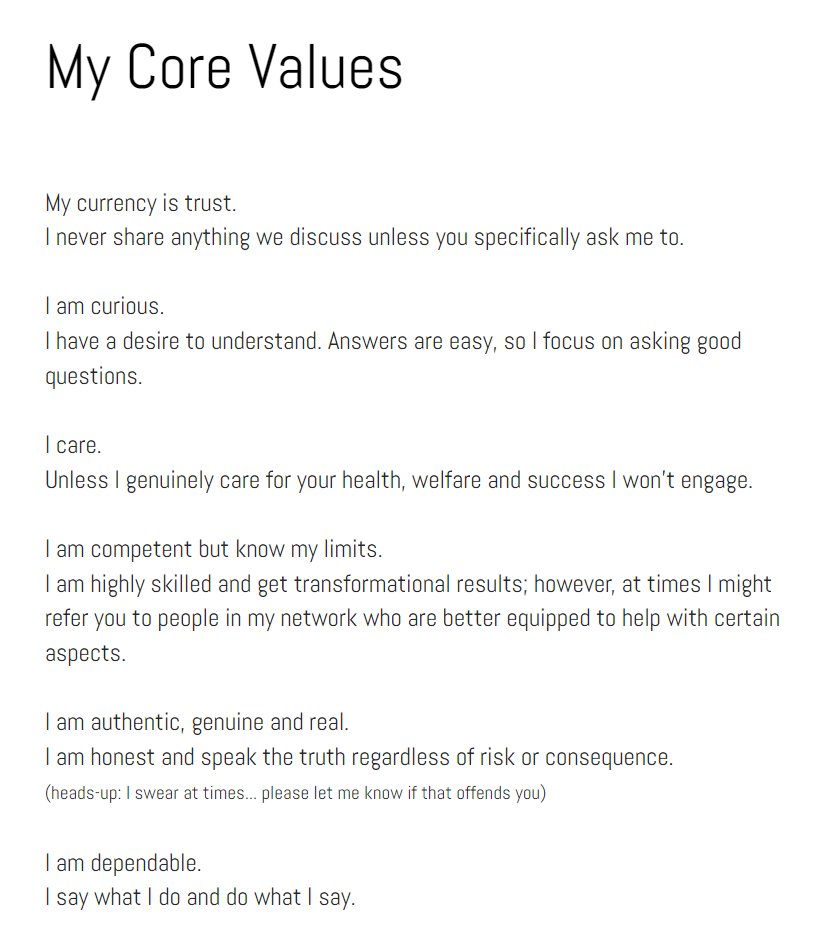 A value statement from a startup coach
A value statement from a startup coach
Make sure to concisely describe your philosophy, methodologies, and approach to coaching to set the right expectations and distinguish yourself from the crowd. These sections can be followed by a more formal bio along with your credentials.
It’s also important to specify who your clients are and what level of involvement they can expect from you.
 A target audience description from a leadership coach
A target audience description from a leadership coach
Then, you may want to describe your work process, explaining what happens after someone signs up for one of your programs.
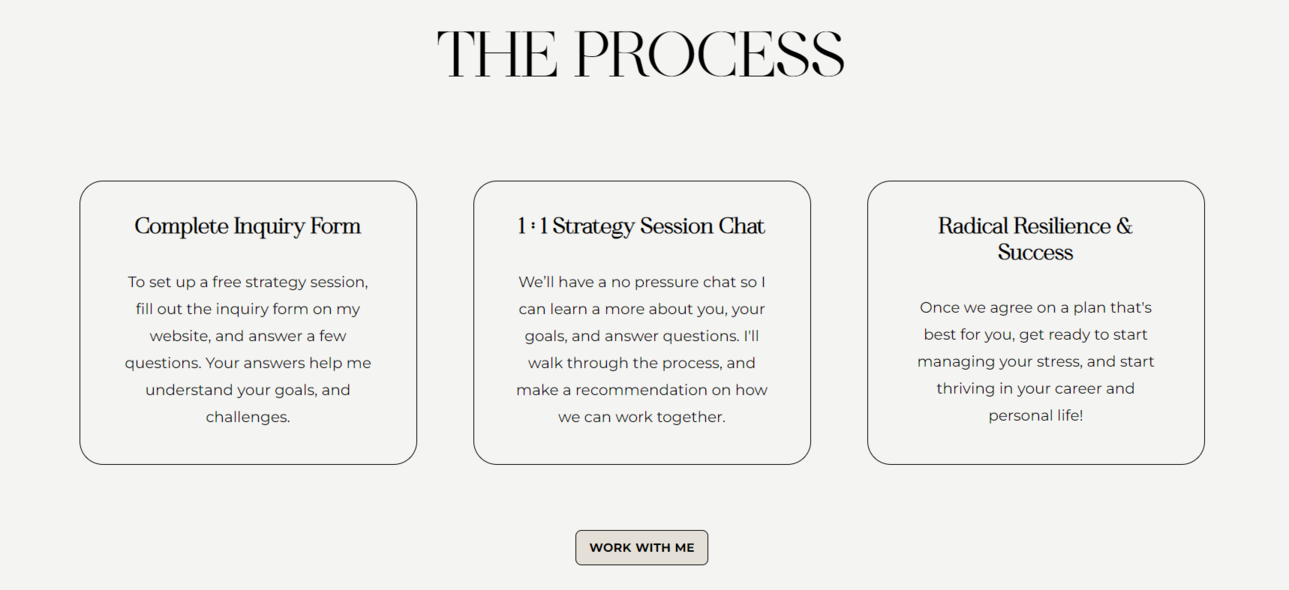 A work process description from a leadership coach
A work process description from a leadership coach
A good way to tie things up is by adding a FAQ section to your coaching website. This is where you can address and clarify the most common customer doubts and concerns while also highlighting the benefits of your approach.
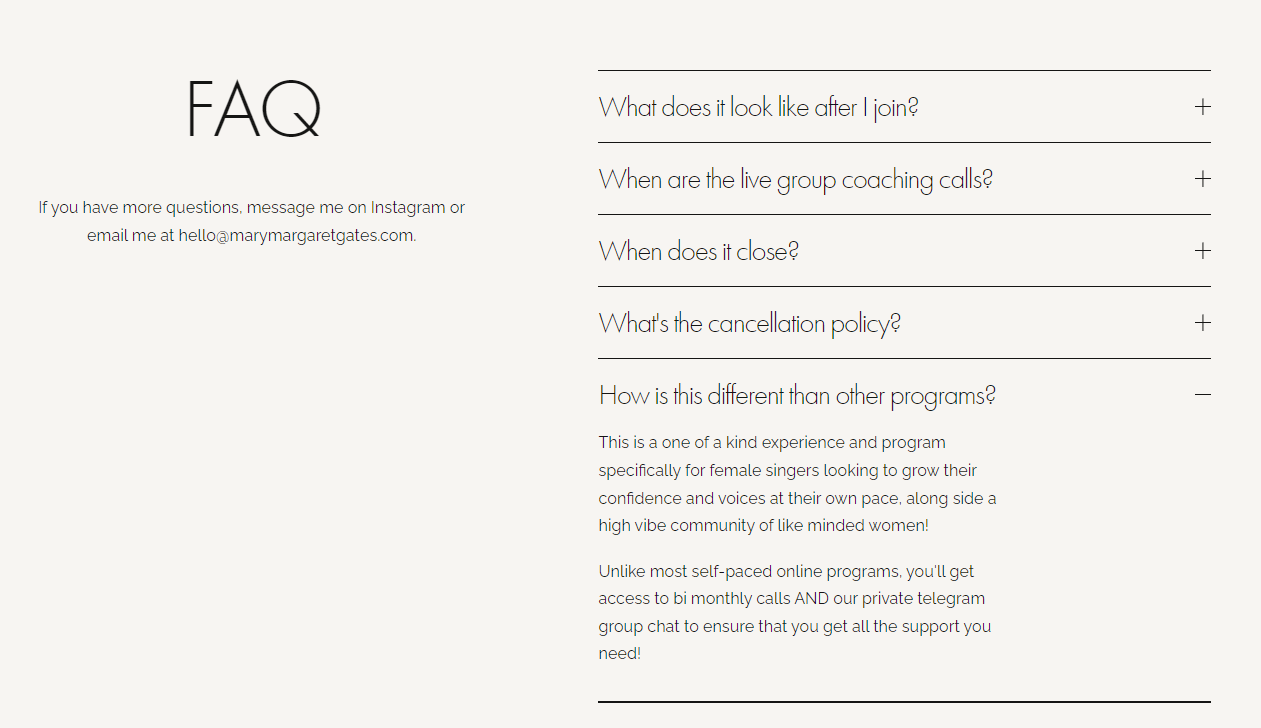 A FAQ section from a voice coach’s website
A FAQ section from a voice coach’s website
With SendPulse, you can create a similar landing page or a multi-page website for your coaching business with ease. Our AI-powered visual builder has dozens of customizable templates and allows you to drag and drop different blocks, adjusting the site structure to match your vision. There is also a built-in CRM to help you keep track of clients and product sales.
As a coach, you may want to use diverse social channels to spread your knowledge far and wide. The most important thing here is to help your audience navigate and differentiate between them — in short, they should know what kind of content to expect, where, and how often.
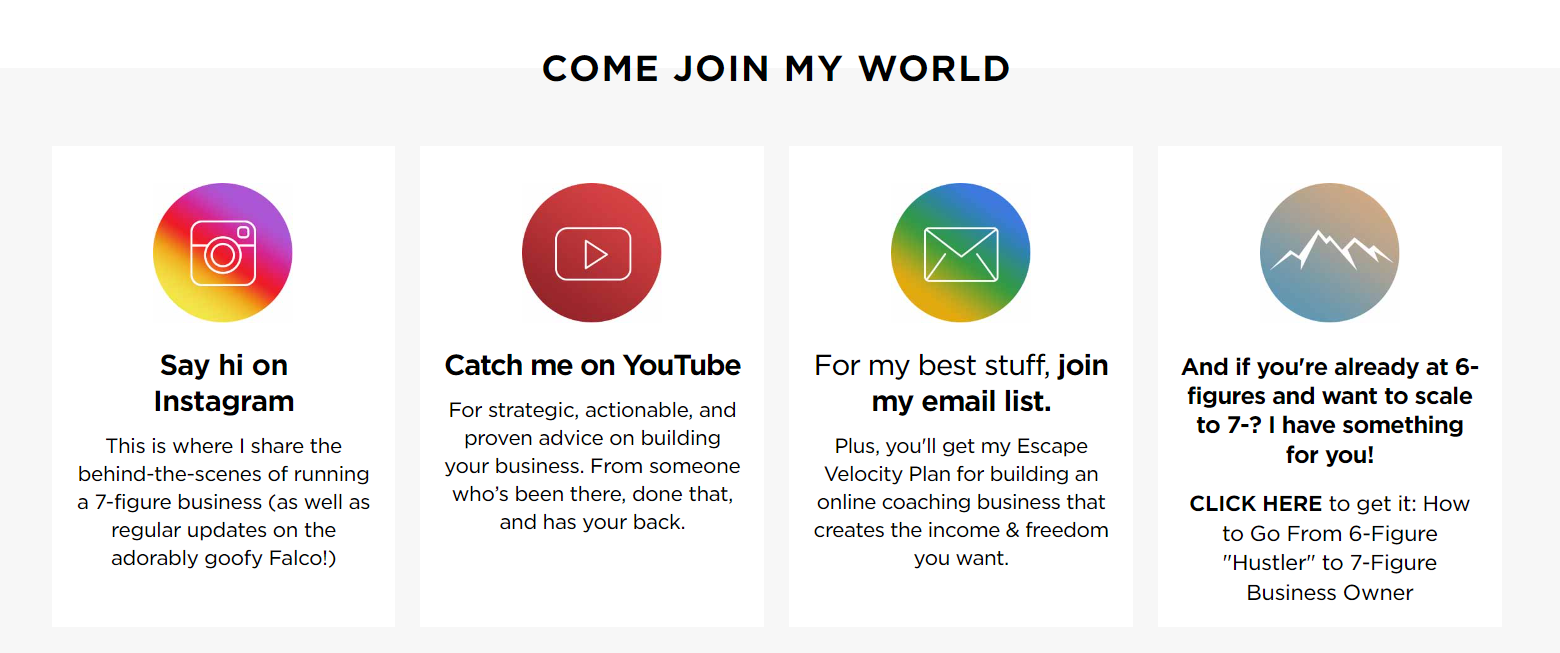 An example of a coach skillfully utilizing diverse social media
An example of a coach skillfully utilizing diverse social media
Tailored content positions you as an expert in your niche, attracting an audience that is specifically interested in your subject matter. Package your client success stories, actionable tips, and mindset-shifting content into Instagram posts, Reels, guides, long-form videos, podcasts, eBooks, checklists, YouTube Shorts, tutorials, and carousels to give your audience a variety of formats to explore.
Expand your reach and connect with your audience through online challenges
Online challenges can be a fantastic tool for coaches as they help bring people together around a shared goal or theme. Unlike passive content, such as blogs or videos, online challenges require participants to take action — and to do so consistently. They engage users in a structured way, allowing them to experience your coaching style and build momentum towards their goals.
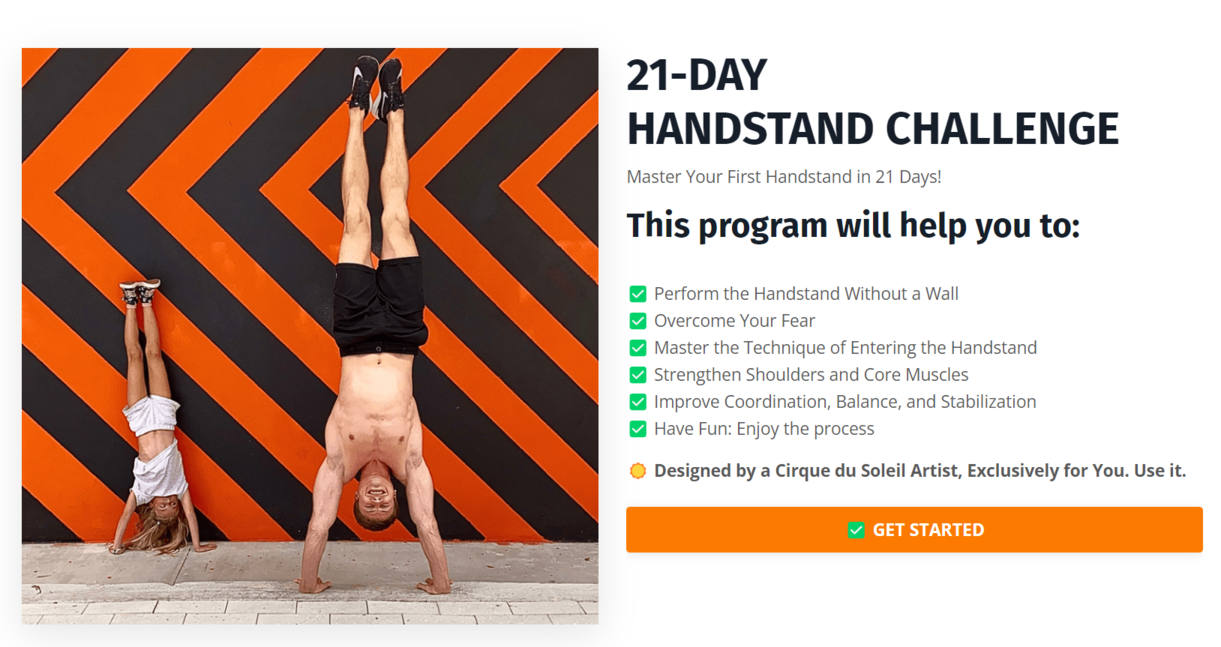 A fitness challenge from a movement coach
A fitness challenge from a movement coach
You can organize free online challenges that align with your coaching focus, such as a “30-Day Deep Stress Reset” or “21 Days to Becoming an Early Riser.” Make sure to promote the challenge across your social media platforms and mailing list, and offer a special coaching package at the end for participants who want to continue their journey.
Introduce educational products like webinars, masterclasses, and online courses
Launching and selling digital products can be a nice addition to any coaching business, as it allows you to diversify your income streams and reach a global audience. Hosting on-demand or live webinars, masterclasses, or online courses allows you to showcase your knowledge and skills in a structured, impactful way. When participants see the value in your teachings, it solidifies your position as an authority in your field.
SendPulse has a visual online course builder, which is perfect for testing ideas and creating intuitively structured courses in a short time.
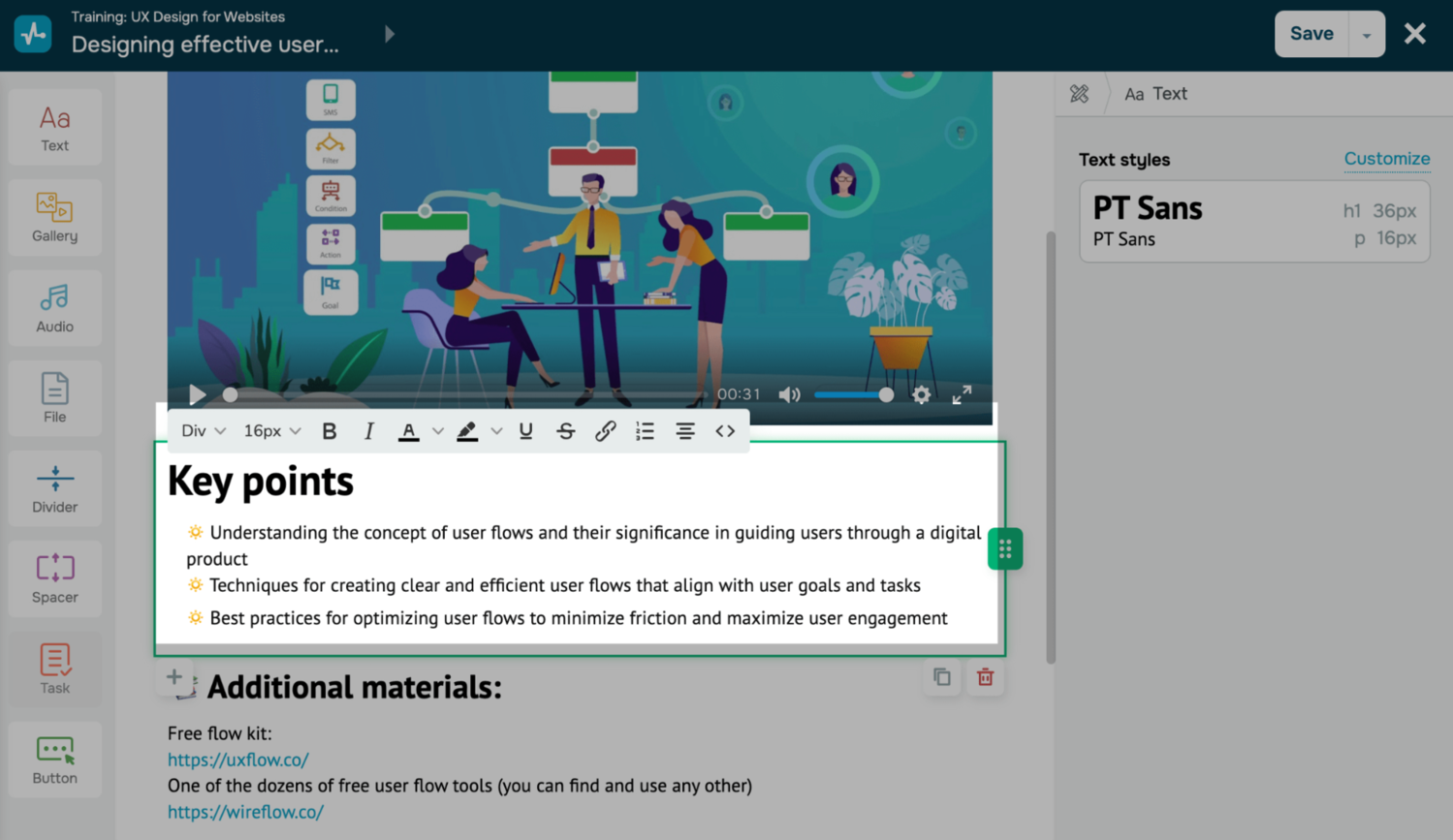 Creating an online course with SendPulse
Creating an online course with SendPulse
Within our course-building platform, you can interact with your students, conduct tests, and even issue certificates of completion. It allows you to track their progress and analyze their involvement in the learning process.
Unlike one-on-one coaching, which is time-bound, educational products can be scaled without requiring additional time investment per customer. Once created, these products can be sold repeatedly, generating passive income and allowing you to reach more people without any extra effort. You can also offer a free consultation or a discount on your coaching services to webinar attendees as an incentive to take the next step.
Get serious about personalized email marketing
Personalized email marketing is key to building stronger, more meaningful relationships with your clients and prospects. This medium allows for more impactful communication and deeper content without interruptions.
Email marketing for coaches starts with building a mailing list. You can start building one by offering a lead magnet and sending in-depth, value-packed emails that guide subscribers through a journey toward health or success.
Our code-free pop-up builder enables you to capture your website visitors’ email addresses in a streamlined manner.
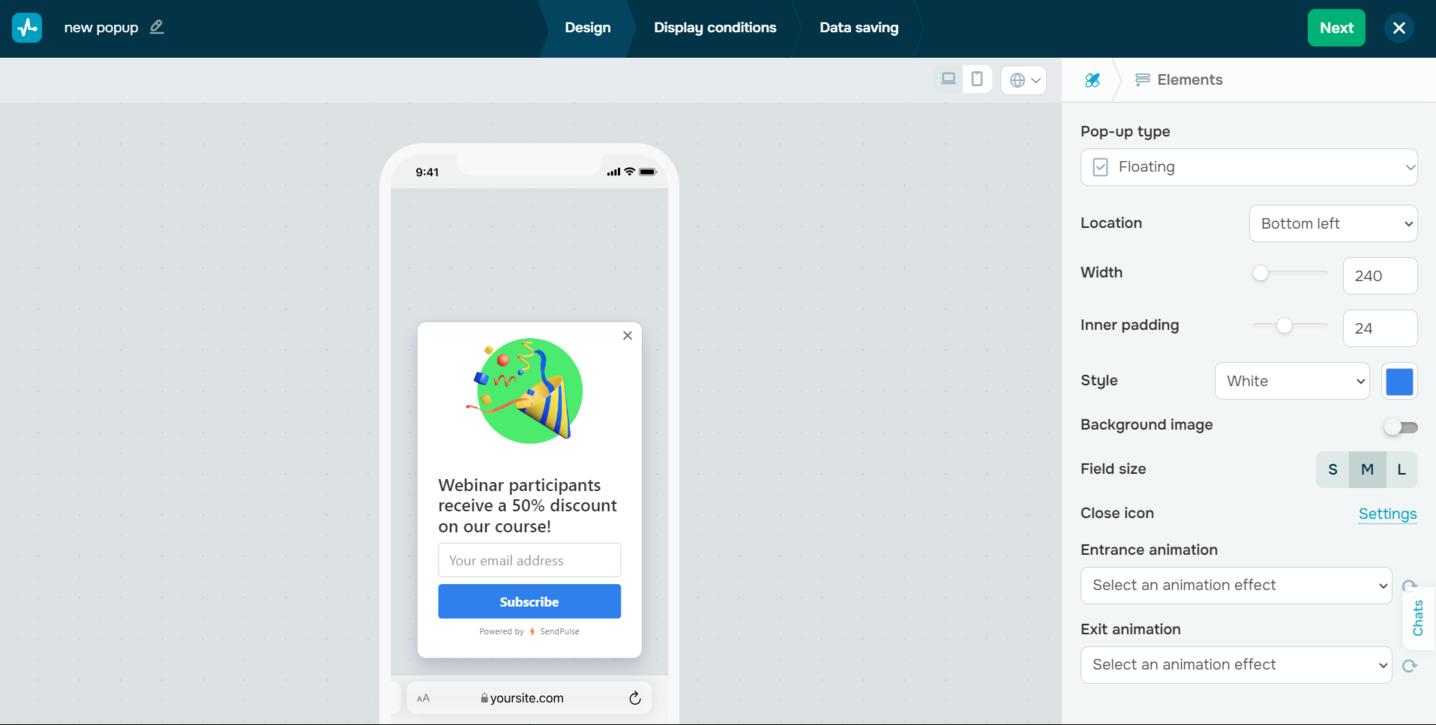 Creating a lead capture form in SendPulse
Creating a lead capture form in SendPulse
From the get-go, segment your mailing list based on interests or behavior to ensure that your content is highly relevant to each subscriber. By doing so, you demonstrate a deep understanding of each client’s journey and a genuine interest in helping them succeed.
Personalized emails often address recipients by their name, refer to their specific goals or challenges, and offer tailored advice or content. They can also include follow-ups on previous sessions, reminders about upcoming appointments, or special offers based on a client’s preferences or milestones.
You can build these and other sorts of coaching emails in our drag-and-drop email builder. It comes with responsive templates, automation capabilities, AI assistant, audience segmentation, variables for deep personalization, and analytics tools. Our spam checker and other built-in tools will help you make sure every campaign reaches the intended audience.
Share and celebrate your clients’ successes
Potential clients want to see proof that your coaching works, and nothing proves it better than the words of your existing clients. Your success stories can serve as powerful testimonials that validate your methods and build credibility. They showcase the transformation that your clients have experienced through coaching, from overcoming challenges to reaching significant milestones.
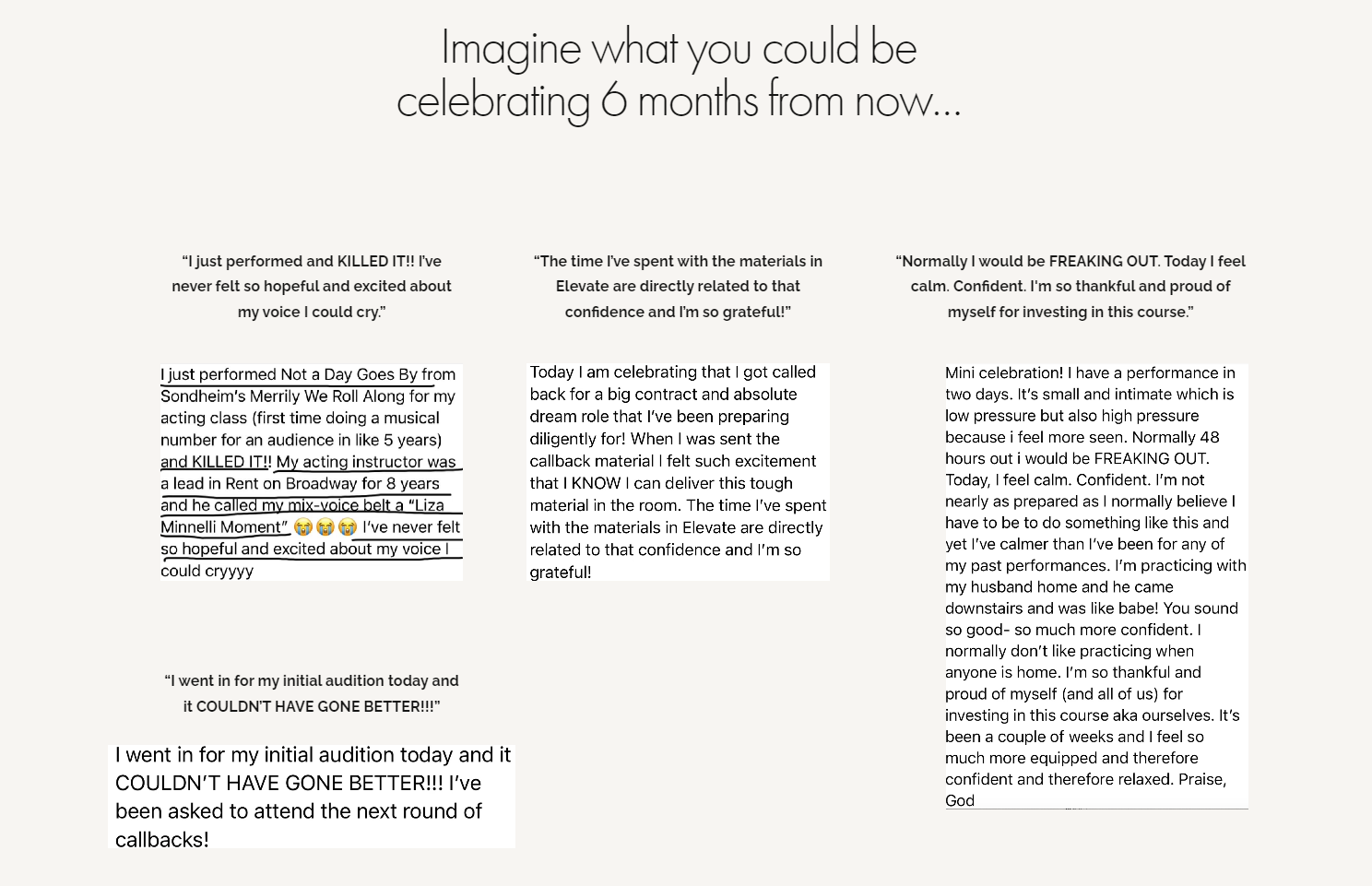 Social proof from a voice coach’s website
Social proof from a voice coach’s website
When in doubt, use video testimonials where possible, as they tend to be more engaging and authentic. Screenshots can also make your social proof more believable and traceable. Vivid client success stories are perfect for sharing on social media and in newsletters, podcasts, blogs, and landing pages. These kinds of stories can inspire skeptical potential clients who may be facing similar challenges, showing them that anything is possible with the right guidance.
Establishing a vibrant, supportive community is a crucial step to becoming a recognized opinion leader in your niche. An exclusive community provides ongoing value and creates a space for potential clients to experience your coaching indirectly.
The communities where members share experiences and hype each other up can do wonders for client loyalty. They’re also more likely to attract new members who are drawn to the positive, judgment-free collaborative environment.
As a coach, you can facilitate ongoing conversations, share exclusive content, initiate challenges, do regular livestreams, comment on your members’ achievements, and encourage peer-to-peer learning.
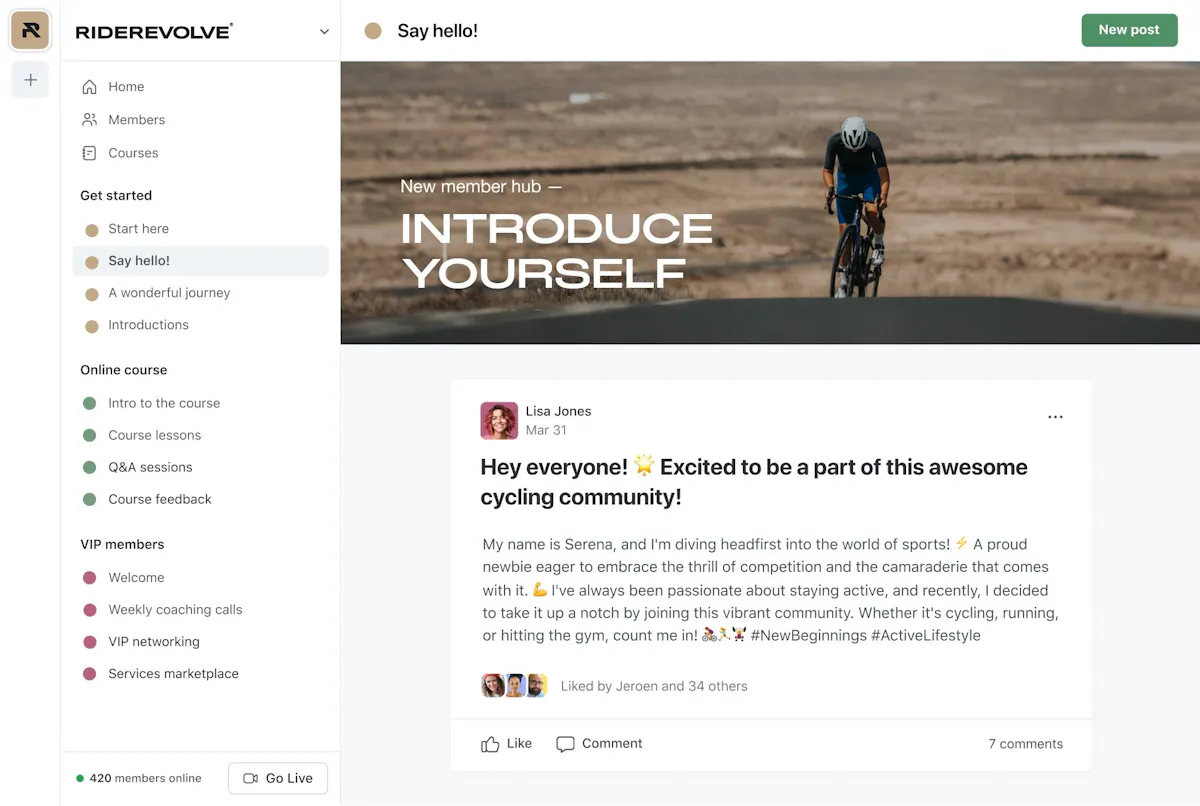 An example of a peer-to-peer online community
An example of a peer-to-peer online community
To get started, select a social media platform like Telegram, WhatsApp, Patreon, or Facebook based on the features that suit your needs. Consider aspects like group chat capabilities, privacy settings, and ease of use. Telegram, for example, offers channels for broadcasting messages and groups for interactive discussions.
Once your community has significantly grown, you can consider moving to a dedicated community management platform like Circle or Disciple.
Supercharge your coaching marketing with SendPulse
Coaching is inherently personal. The more connected and understood clients feel, the more likely they are to open up, engage deeply in the process, and achieve their goals. SendPulse can help you connect with your audience at every step of their self-improvement journey.
We offer a CRM, an email solution, a website builder, a chatbot builder, an SMS platform, an LMS, and more. All of these tools can be used without any prior coding knowledge and can be accessed from the same tab.